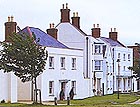Property Crash Predicted
The UK property market will witness dramatic price falls within two years, according to a report from Morgan Stanley but Knight Frank disagrees


A substantial fall in house prices is likely within the next two years, according to a new report. Research led by David Miles, chief UK economist of Morgan Stanley, has shown that speculative house price inflation is creating a volatile market with impending price drops. Home buyers are expecting double digit price rises in 2006 compared to 2% in 1996 - but as soon as prices fail to meet this level, a fall is inevitable, says Morgan Stanley. 'A substantial fall in real house prices is likely at some point in the relatively near future, though it could yet be one to two years away,' explains Mr Miles. According to Knight Frank, the UK property market does not have the 'trigger' needed to kick-start price falls. 'In 2004/2005 housing deals fell dramatically but house price inflation never dropped below 5%,' explained Liam Bailey from Knight Frank research. Population growth, increased construction and a good economy, the ingredients for a strong housing market, are present and correct, says Knight Frank. But the Morgan Stanley report suggests the housing market has weaker links with the wider economy than one might expect. Prices are driven to a large extent by the speculative nature of incomes, interest rates and demand ? home buyers rely on the certainty house prices will continue to rise along with incomes. 'If house prices are expected to rise, this reduces the effective cost of owning a home as the capital gain offsets the cost of paying interest (or foregoing interest on home equity) and undertaking repairs and maintenance and paying taxes,' Mr Miles explains. But the report suggests this 'bubble building' mentality is potentially destabilising as higher house prices do in fact increase the cost of home ownership, plus there is always a degree of mean reversion built into the way people are assumed to form expectations and, a higher level of real house prices does increase the cost of home ownership. Prices are currently at record levels, forcing buyers to borrow more and more. Fewer than one in five properties now escapes the £125,000 stamp duty threshold, with the average property price now around £220,000, according to recent figures. 'There is no doubt the UK market is volatile by international standards,' said Mr Bailey. 'The price limits on most areas of the market, except perhaps the prime country house market and prime central London, have been reached. The only thing enabling people to spend more is wage growth.' But Mr Bailey is certain Britain is not heading for a housing market crash. 'People are much more wise than they used to be,' he said. 'The panic just isn't there.'
Exquisite houses, the beauty of Nature, and how to get the most from your life, straight to your inbox.
Country Life is unlike any other magazine: the only glossy weekly on the newsstand and the only magazine that has been guest-edited by His Majesty The King not once, but twice. It is a celebration of modern rural life and all its diverse joys and pleasures — that was first published in Queen Victoria's Diamond Jubilee year. Our eclectic mixture of witty and informative content — from the most up-to-date property news and commentary and a coveted glimpse inside some of the UK's best houses and gardens, to gardening, the arts and interior design, written by experts in their field — still cannot be found in print or online, anywhere else.

